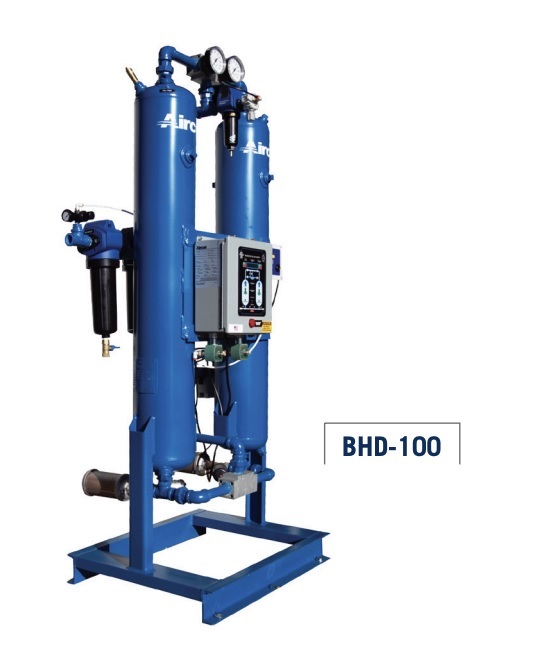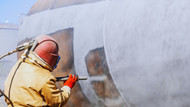Breathing Air System Essentials for Abrasive Blast…
Posted by AVP on Jul 11th 2024
When it comes to abrasive blasting operations, the significance of a breathing air system cannot be overstated. These systems are the unsung protectors, ensuring that operators are safe from inhaling hazardous substances that could jeopardize their health. Let’s dive into the importance and functionality of breathing air systems and why they are indispensable in abrasive blasting.
The Role of Breathing Air Systems
Breathing air systems protect workers from the harmful substances generated during abrasive blasting. Here's how they keep our operations safe and efficient:
- Air Quality Control: Ensuring the air operators breathe meets safety standards is paramount. Breathing air systems filter out contaminants such as carbon monoxide and hydrocarbons, maintaining oxygen levels in compliance with OSHA standards. This rigorous air purification is crucial in preventing health issues related to inhaling toxic dust and fumes.
- Respiratory Protection: Operators use supplied-air respirators connected to these systems, providing a continuous flow of clean air. This setup is critical in preventing the inhalation of harmful particles, making sure our team remains healthy and focused on their tasks.
- Regulatory Compliance: Compliance with regulations is non-negotiable. Using breathing air systems helps us meet OSHA standards for Grade D breathing air, ensuring permissible levels of oxygen, hydrocarbons, carbon monoxide, carbon dioxide, and moisture content in the air. Staying within these parameters is vital for legal and safety reasons.
- Operational Efficiency: Health-related work stoppages can severely impact productivity. Breathing air systems mitigate this risk by ensuring a safe working environment, allowing operations to proceed smoothly and efficiently.
- Versatility: Whether it's dry or wet blasting, or different types of abrasive materials and techniques, breathing air systems are adaptable, making them suitable for various environments and conditions.
Inspecting and Servicing Compressed Air Dryers
Keeping our compressed air dryers in top condition is crucial. These machines are essential in removing moisture from the air, ensuring that our abrasive blasting process runs smoothly and safely.
If dryers aren’t kept in good shape, moisture can build up inside and cause rust. This not only damages the equipment but also shortens its lifespan.
Consider a scenario where moisture mixes with contaminants in the air. Combined, this situation can become quite dangerous for those working in it.
For example, if the air isn't sufficiently dry, it can cause the abrasive materials to clump together, making the blasting process less efficient. Moisture can cause "rust bloom" on metal surfaces, which messes up the surface prep and can ruin the final coating.
To prevent these issues, regular inspections and servicing of your compressed air dryers are necessary. Regular check-ups let you spot issues early, keeping your equipment running smoothly and ensuring the air stays clean and dry. By doing so, we protect our operators' health and maintain the integrity of our blasting operations.
READ: The Importance Of Regularly Inspecting And Servicing Compressed Air Dryers
Similarities with University Research Laboratories
The importance of breathing air systems in our abrasive blasting operations is quite similar to their role in university research labs. Both environments need clean air without contaminants to keep things safe and running smoothly.
Inside research labs, scientists really count on special air systems to get their work done. Maintaining a spotless lab setup means that critical research can proceed unhindered by concerns over contaminants. This keeps our science as accurate as possible. If the air isn't clean, research findings might be skewed and people's health could suffer.
When we're working, especially with all the debris and gas from blasting, we trust our breathing air systems to keep everything safe for us. Imagine performing an abrasive blasting task without a proper air filtration system.
Breathing in dust and fumes can cause major health problems, similar to how unfiltered air in a lab might spoil experiments and put researchers at risk. Our aim is to make sure every breath our operators take is safe. Just like researchers need clean air for their experiments, we want the same safety in all environments.
Keeping everything working well means scheduling routine checks and performing necessary maintenance tasks. Without it, the air quality could take a hit. Just as labs routinely check their equipment to avoid compromising their sterile conditions, we must ensure our breathing air systems are in top shape to maintain a safe working environment.
ALSO READ: Breathing Air Systems For University Research And Laboratories

The Aircel BHD Series
One of the standout products in our breathing air system lineup is the Aircel BHD Series (50 – 600 scfm). This fully automatic system uses a unique dual tower regeneration process to purify compressed air, effectively removing contaminants like dust, dirt, water, oil, hydrocarbon vapor, and dangerous levels of carbon monoxide.
The Aircel BHD Series is equipped with a high-quality Carbon Monoxide (CO) Monitor, which constantly senses CO concentrations, ensuring the safety of all users. The Aircel Programmable Controller (APC) provides complete control over the system, offering text descriptions of each operational step. With robust valving and a comprehensive filtration setup—including coalescing pre-filters, activated carbon after-filters, and particulate final filters—the BHD Series ensures our breathing air system remains top-notch.
Do Abrasive Blasting Operations Need Dew Point Meters?
Absolutely. Dew point meters are critical in abrasive blasting operations for several reasons:
- Preventing Moisture Condensation: Dew point meters help determine the temperature at which moisture will condense on surfaces. Maintaining a surface temperature at least 5°F (3°C) higher than the dew point prevents condensation, avoiding issues like rust bloom or flash rusting on prepared surfaces.
- Quality Control: Measuring and documenting environmental conditions before, during, and after blasting ensures the quality of surface preparation. This step is essential for proper coating adhesion and longevity.
- Compliance with Standards: Dew point meters aid in complying with industry standards from organizations like ASTM and SSPC, which often mandate environmental condition monitoring, including the dew point.
- Operational Efficiency: Accurate dew point measurement prevents delays or rework due to improper conditions, keeping projects on schedule and within budget.
The Seven-Stage Purification Process
The BHD Series offers a unique seven-stage purification process, eliminating the need for an additional purification vessel required by many competitive designs. This advanced system ensures the highest level of air purity, safeguarding our operators and enhancing the overall efficiency of our operations.
We invite you to explore our comprehensive collection of breathing air systems to find the perfect solution for your abrasive blasting needs. Invest in safety, compliance, and efficiency—check out our breathing air system collection today!
